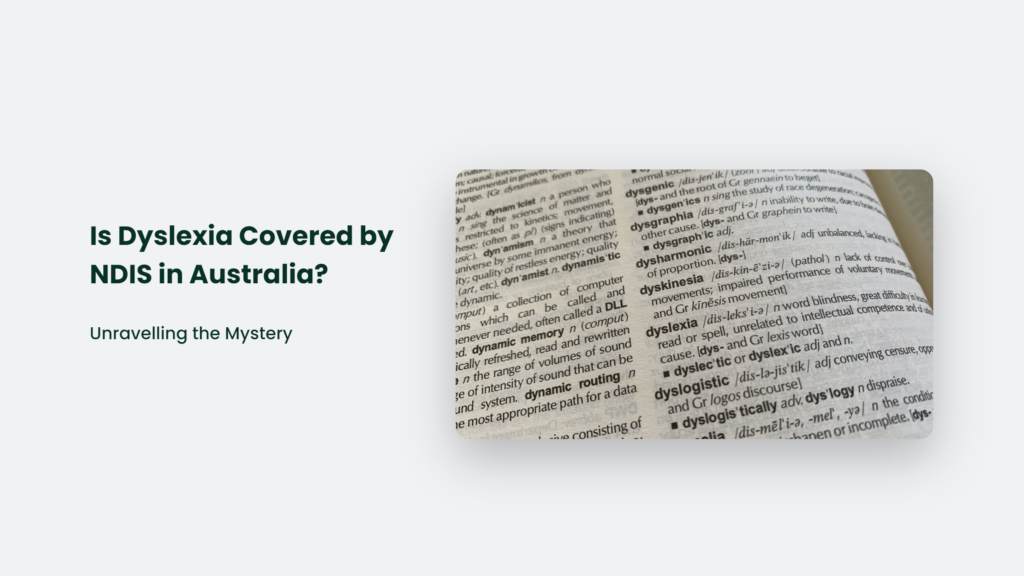

Is Dyslexia Covered by NDIS in Australia? Unravelling the Mystery

As Seen On
Dyslexia, a learning difficulty affecting reading and writing skills, is a challenge many individuals face worldwide. The question often arises in Australia: is dyslexia covered by NDIS?
In this comprehensive article, we’ll dive into the world of dyslexia and NDIS, exploring the nuances of this complex topic and providing you with the information you need to navigate the system.

Dyslexia in brief:
Dyslexia is a neurobiological learning disability characterized by difficulties with accurate and/or fluent word recognition, poor spelling, and decoding abilities. These difficulties typically result from a deficit in the phonological component of language, which is often unexpected in relation to other cognitive abilities and the provision of effective classroom instruction.
Dyslexia affects a person’s ability to read, spell, write, and speak, but it is unrelated to intelligence, hearing, or vision. The exact causes of dyslexia are not completely clear, but it is believed to be linked to genetic factors and differences in how the brain processes language. People with dyslexia often struggle with recognizing phonemes, which are the basic sounds of speech, making it difficult for them to connect letters to sounds and blend sounds into words.
Dyslexia in Australia: A Brief Overview
Dyslexia affects approximately 1 in 10 people, which means that with a global population of 7.8 billion, there are around 780 million people with dyslexia worldwide. In Australia, dyslexia is recognized under the Disability Discrimination Act 1992. However, the NDIS doesn’t directly cover dyslexia as a disability. So, what does this mean for those seeking support for dyslexia through NDIS?
NDIS and Dyslexia: A Complex Relationship
While the NDIS doesn’t directly cover dyslexia, there is a possibility for individuals to allocate some of their NDIS funds to improve their reading skills, depending on their situation. For example, if dyslexia is comorbid with other significant impairments, NDIS funding may be available.
In one inspiring case, a determined parent named Kate Cole managed to secure NDIS funding for her child living with dyslexia. Through a combination of medical reports, progress reports from her child’s school, and a strong advocacy effort, Kate was able to access NDIS support for her child’s dyslexia treatment.
This example demonstrates that while it may be challenging, it is not impossible to receive NDIS funding for dyslexia.
The Power of Persistence: Overcoming Dyslexia Challenges
Dyslexia is not a life sentence, and many individuals with dyslexia have gone on to achieve great success. As the famous quote by Nelson Mandela goes, “It always seems impossible until it’s done”. This sentiment rings true for those with dyslexia, as countless individuals have overcome their reading difficulties and thrived in various fields.
For example, renowned lawyer and advocate Erin Brockovich once said, “When someone helping you get frustrated, don’t let them. Take a step back, because you can’t learn anything under pressure. And don’t worry about the label [dyslexia]!”.
Frequently Asked Questions:
Is dyslexia covered by NDIS in Australia?
The NDIS doesn’t directly cover dyslexia as a disability. However, depending on your situation, you may be able to allocate some of your NDIS funds to improve your reading skills.
Can individuals with dyslexia succeed in life?
Yes, many individuals with dyslexia have gone on to achieve great success in various fields. With determination and the right support, individuals with dyslexia can overcome their challenges and thrive.
What support is available for individuals with dyslexia in Australia?
While NDIS funding may not be directly available for dyslexia, there are other resources and support options available, such as specialized tutoring, assistive technology, and accommodations in educational settings.
Conclusion
In conclusion, while dyslexia is not directly covered by NDIS in Australia, there are instances where individuals may be able to allocate some of their NDIS funds to improve their reading skills. The key takeaway is that with persistence, advocacy, and the right support, individuals with dyslexia can overcome their challenges and achieve success. Remember, as the saying goes, “It always seems impossible until it’s done”
Konger
Up until working with Casey, we had only had poor to mediocre experiences outsourcing work to agencies. Casey & the team at CJ&CO are the exception to the rule.
Communication was beyond great, his understanding of our vision was phenomenal, and instead of needing babysitting like the other agencies we worked with, he was not only completely dependable but also gave us sound suggestions on how to get better results, at the risk of us not needing him for the initial job we requested (absolute gem).
This has truly been the first time we worked with someone outside of our business that quickly grasped our vision, and that I could completely forget about and would still deliver above expectations.
I honestly can't wait to work in many more projects together!
Disclaimer
*The information this blog provides is for general informational purposes only and is not intended as financial or professional advice. The information may not reflect current developments and may be changed or updated without notice. Any opinions expressed on this blog are the author’s own and do not necessarily reflect the views of the author’s employer or any other organization. You should not act or rely on any information contained in this blog without first seeking the advice of a professional. No representation or warranty, express or implied, is made as to the accuracy or completeness of the information contained in this blog. The author and affiliated parties assume no liability for any errors or omissions.

